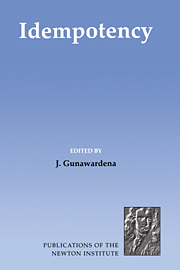Book contents
- Frontmatter
- Contents
- Foreword
- Preface
- List of Participants
- An introduction to idempotency
- Tropical semirings
- Some automata-theoretic aspects of min-max-plus semirings
- The finite power property for rational sets of a free group
- The topological approach to the limitedness problem on distance automata
- Types and dynamics in partially additive categories
- Task resource models and (max, +) automata
- Algebraic system analysis of timed Petri nets
- Ergodic theorems for stochastic operators and discrete event networks.
- Computational issues in recursive stochastic systems
- Periodic points of nonexpansive maps
- A system-theoretic approach for discrete-event control of manufacturing systems
- Idempotent structures in the supervisory control of discrete event systems
- Maxpolynomials and discrete-event dynamic systems
- The Stochastic HJB equation and WKB method
- The Lagrange problem from the point of view of idempotent analysis
- A new differential equation for the dynamics of the Pareto sets
- Duality between probability and optimization
- Maslov optimization theory: topological aspect
- Random particle methods in (max, +) optimization problems
- The geometry of finite dimensional pseudomodules
- A general linear max-plus solution technique
- Axiomatics of thermodynamics and idempotent analysis
- The correspondence principle for idempotent calculus and some computer applications
Foreword
Published online by Cambridge University Press: 05 May 2010
- Frontmatter
- Contents
- Foreword
- Preface
- List of Participants
- An introduction to idempotency
- Tropical semirings
- Some automata-theoretic aspects of min-max-plus semirings
- The finite power property for rational sets of a free group
- The topological approach to the limitedness problem on distance automata
- Types and dynamics in partially additive categories
- Task resource models and (max, +) automata
- Algebraic system analysis of timed Petri nets
- Ergodic theorems for stochastic operators and discrete event networks.
- Computational issues in recursive stochastic systems
- Periodic points of nonexpansive maps
- A system-theoretic approach for discrete-event control of manufacturing systems
- Idempotent structures in the supervisory control of discrete event systems
- Maxpolynomials and discrete-event dynamic systems
- The Stochastic HJB equation and WKB method
- The Lagrange problem from the point of view of idempotent analysis
- A new differential equation for the dynamics of the Pareto sets
- Duality between probability and optimization
- Maslov optimization theory: topological aspect
- Random particle methods in (max, +) optimization problems
- The geometry of finite dimensional pseudomodules
- A general linear max-plus solution technique
- Axiomatics of thermodynamics and idempotent analysis
- The correspondence principle for idempotent calculus and some computer applications
Summary
Hewlett-Packard's Basic Research Institute in the Mathematical Sciences (BRIMS) was set up in 1994 as a joint undertaking between Hewlett-Packard Laboratories in Bristol and the Isaac Newton Institute for Mathematical Sciences in Cambridge.
BRIMS represents a pioneering attempt to create an environment for fundamental research, which draws upon the best aspects of both academia and industry. It exemplifies our belief that science and technology should stimulate and influence each other.
Proceedings of workshops and conferences at BRIMS are eligible for publication in this series of Publications of the Newton Institute by virtue of a special arrangement with Cambridge University Press. We welcome such volumes as evidence of the quality and vitality of scientific activity at BRIMS.
- Type
- Chapter
- Information
- Idempotency , pp. vii - viiiPublisher: Cambridge University PressPrint publication year: 1998

